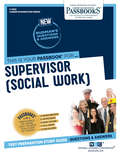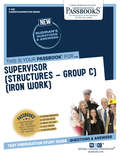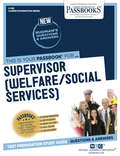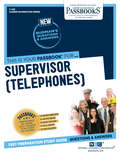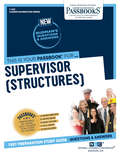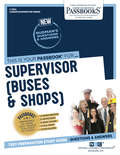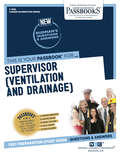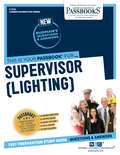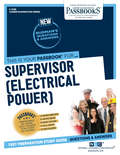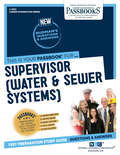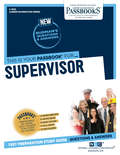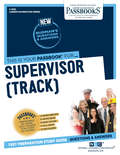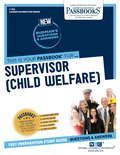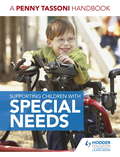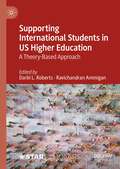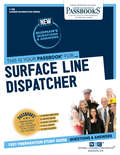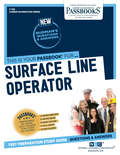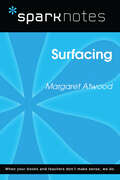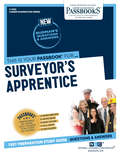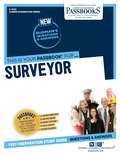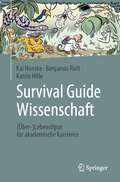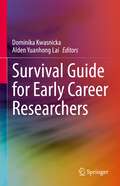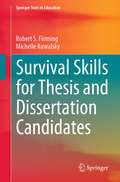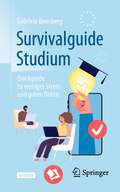- Table View
- List View
Supervisor: Passbooks Study Guide (Career Examination Series #C-1052)
by National Learning CorporationThe Supervisor (Social Work) Passbook® prepares you for your test by allowing you to take practice exams in the subjects you need to study. It provides hundreds of questions and answers in the areas that will likely be covered on your upcoming exam.
Supervisor: Passbooks Study Guide (Career Examination Series #C-3510)
by National Learning CorporationThe Supervisor (Structures-Group C) (Iron Work) Passbook® prepares you for your test by allowing you to take practice exams in the subjects you need to study. It provides hundreds of questions and answers in the areas that will likely be covered on your upcoming exam, including but not limited to: Construction, maintenance, installation, repair, alteration, and inspection of structural and ornamental ironwork components; Supervisory skills and techniques; Assigning, reviewing, and evaluating the work of subordinates; Technical aspects of the ironwork trade; and more.
Supervisor: Passbooks Study Guide (Career Examination Series #C-3510)
by National Learning CorporationThe Supervisor (Welfare/Social Services) Passbook® prepares you for your test by allowing you to take practice exams in the subjects you need to study. It provides hundreds of questions and answers in the areas that will likely be covered on your upcoming exam, including but not limited to: ability to efficiently and safely manage a central storeroom, or a group of satellite storerooms, or other major subdivisions of the stores division; ability to assign, review and evaluate the work of subordinates; knowledge of labor relations; technical knowledge of authority storeroom methods, systems and procedures; ability to plan for and supervise the orderly and efficient storage and distribution of materials; and more.
Supervisor: Passbooks Study Guide (Career Examination Series #C-3510)
by National Learning CorporationThe Supervisor (Telephones) Passbook® prepares you for your test by allowing you to take practice exams in the subjects you need to study. It provides hundreds of questions and answers in the areas that will likely be covered on your upcoming exam.
Supervisor: Passbooks Study Guide (Career Examination Series #C-3510)
by National Learning CorporationThe Supervisor (Structures) Passbook® prepares you for your test by allowing you to take practice exams in the subjects you need to study. It provides hundreds of questions and answers in the areas that will likely be covered on your upcoming exam.
Supervisor: Passbooks Study Guide (Career Examination Series #C-3510)
by National Learning CorporationThe Supervisor (Buses and Shops) Passbook® prepares you for your test by allowing you to take practice exams in the subjects you need to study. It provides hundreds of questions and answers in the areas that will likely be covered on your upcoming exam.
Supervisor: Passbooks Study Guide (Career Examination Series #C-3510)
by National Learning CorporationThe Supervisor (Ventilation and Drainage) Passbook® prepares you for your test by allowing you to take practice exams in the subjects you need to study. It provides hundreds of questions and answers in the areas that will likely be covered on your upcoming exam.
Supervisor: Passbooks Study Guide (Career Examination Series #C-3510)
by National Learning CorporationThe Supervisor (Lighting) Passbook® prepares you for your test by allowing you to take practice exams in the subjects you need to study. It provides hundreds of questions and answers in the areas that will likely be covered on your upcoming exam.
Supervisor: Passbooks Study Guide (Career Examination Series #C-3510)
by National Learning CorporationThe Supervisor (Electrical Power) Passbook® prepares you for your test by allowing you to take practice exams in the subjects you need to study. It provides hundreds of questions and answers in the areas that will likely be covered on your upcoming exam.
Supervisor: Passbooks Study Guide (Career Examination Series #C-3510)
by National Learning CorporationThe Supervisor (Water & Sewer Systems) Passbook® prepares you for your test by allowing you to take practice exams in the subjects you need to study. It provides hundreds of questions and answers in the areas that will likely be covered on your upcoming exam, including but not limited to: supervision; water distribution systems and fire hydrants; installing, repairing and servicing fire hydrants, valves and water service boxes and maintaining water lines; sanitary and storm sewer systems; sewer system safety and trenching practices; understanding and interpreting technical information and construction and site plans; and more.
Supervisor: Passbooks Study Guide (Career Examination Series #C-3510)
by National Learning CorporationThe Supervisor Passbook® prepares you for your test by allowing you to take practice exams in the subjects you need to study. It provides hundreds of questions and answers in the areas that will likely be covered on your upcoming exam.
Supervisor: Passbooks Study Guide (Career Examination Series #C-3546-9)
by National Learning CorporationThe Supervisor (Track) Passbook® prepares you for your test by allowing you to take practice exams in the subjects you need to study. It provides hundreds of questions and answers in the areas that will likely be covered on your upcoming exam.
Supervisor: Passbooks Study Guide (Career Examination Series #C-784)
by National Learning CorporationThe Supervisor (Child Welfare) Passbook® prepares you for your test by allowing you to take practice exams in the subjects you need to study. It provides hundreds of questions and answers in the areas that will likely be covered on your upcoming exam, including but not limited to; Social services supervision including staff training and development; Performance evaluation; Problem solving and decision making; Preparation and interpretation of written material; and more.
Supporting Children with Special Needs: A Penny Tassoni Handbook
by Penny TassoniSupport the individual needs of children with this practical and informative guide from Penny TassoniFully matched to the new 2014 Special Education Needs and Disability Code of Practice, this Penny Tassoni Handbook explores supporting children with individual needs, working with parents and the issues surrounding SEN and disability. Tassoni's signature style and approach ensures that the government code is translated into a practical, informative and easy-to-read guide for anyone working in the role of a SENCO.- Helps you tailor your strategies in the key areas of communication & interaction, cognition & learning, social, emotional & mental health and sensory and/or physical needs.- Includes a detailed reference section on a wide range of specific needs from autism spectrum condition through to Fragile X.- Uses colourful design and illustrative photos which make theory easy to understand and to put into practice in real world scenarios.- Written in Penny Tassoni's easy-to-read, informative and practical style.
Supporting International Students in US Higher Education: A Theory-Based Approach
by Darbi L. Roberts Ravichandran AmmiganThis book explores the integral role that student affairs professionals play in the success of international students at higher education institutions in the US. International student support has often been thought of as the principal responsibility of international student services offices, but research suggests that international student engagement in the broader university community, and support for them by all student affairs and services offices on campus, is closely tied to persistence and retention. The authors explore a student development theory-based approach to supporting the experience and success of international students from all facets of student affairs and services. The book explores practical and strategic implications of a more integrative approach to international student support both inside and outside of the classroom, while also utilizing a critical lens in applying models that were originally built for predominantly white institutions and US citizens.
Sura’s TNPSC (CCSE IV) Group 4 + VAO (Combined) Exam Book Guide 2024 - Part 1 - General Tamil - Competitive Exam: TNPSC ஒருங்கிணைக்கப்பட்ட GROUP IV மற்றும் VAO தேர்வு பகுதி 1 பொது தமிழ்
by V V K Subburasuஇந்த புத்தகம் வீ.வீ.கே. சுப்புராசு சுரா காலேஜ் ஆஃப் காம்படிஷன் அவர்களால் வெளியிடப்பட்டுள்ளது. இப்புத்தகத்தில் ஒருங்கிணைந்த குடிமைப் பணிகள் தேர்வு 4 மற்றும் கிராம நிர்வாக அலுவலர் பணிகளுக்கான தமிழ் பாடங்களை அறிந்து கொள்ளலாம். மேலும் இப்புத்தகத்தில் கட்டாயத் தமிழ் மொழித் தகுதி மற்றும் மதிப்பீட்டுத் தேர்வுகான வினாக்கள் விளக்கமான விடைகளுடன் தரப்பட்டுள்ளன.
Surface Line Dispatcher: Passbooks Study Guide (Career Examination Series #C-788)
by National Learning CorporationThe Surface Line Dispatcher Passbook® prepares you for your test by allowing you to take practice exams in the subjects you need to study. It provides hundreds of questions and answers in the areas that will likely be covered on your upcoming exam.
Surface Line Operator: Passbooks Study Guide (Career Examination Series)
by National Learning CorporationThe Surface Line Operator Passbook® prepares you for your test by allowing you to take practice exams in the subjects you need to study. It provides hundreds of questions and answers in the areas that will likely be covered on your upcoming exam.
Surfacing (SparkNotes Literature Guide Series)
by SparkNotesSurfacing (SparkNotes Literature Guide) by Margaret Atwood Making the reading experience fun! Created by Harvard students for students everywhere, SparkNotes is a new breed of study guide: smarter, better, faster. Geared to what today's students need to know, SparkNotes provides: *Chapter-by-chapter analysis *Explanations of key themes, motifs, and symbols *A review quiz and essay topicsLively and accessible, these guides are perfect for late-night studying and writing papers
Surveyor's Apprentice: Passbooks Study Guide (Career Examination Series)
by National Learning CorporationThe Surveyor's Apprentice Passbook® prepares you for your test by allowing you to take practice exams in the subjects you need to study. It provides hundreds of questions and answers in the areas that will likely be covered on your upcoming exam.
Surveyor: Passbooks Study Guide (Career Examination Series #C-3030)
by National Learning CorporationThe Surveyor Passbook® prepares you for your test by allowing you to take practice exams in the subjects you need to study. It provides hundreds of questions and answers in the areas that will likely be covered on your upcoming exam.
Survival Guide Wissenschaft: (Über-)Lebenstipps für akademische Karrieren
by Benjamin Rott Katrin Hille Kai NoeskeSurvival Guide Wissenschaft – der unverzichtbare Begleiter für angehende Wissenschaftler:innen! Wertvolle Ratschläge, bewährte Strategien und Insiderwissen aus vielen Jahrzehnten akademischer Laufbahnen mit Kurven, Ecken und Kanten. Tipps und Tricks, Dos and Don’ts, um wissenschaftliche Karrieren an Universitäten und anderen Forschungseinrichtungen zu starten, zu überleben und erfolgreich voranzutreiben. Von der Forschungsplanung bis zur Bewerbung um Stipendien und Stellen, von der Netzwerkbildung bis zur Work-Life-Balance, aber auch Exit-Strategien – dieser Survival Guide liefert die entscheidenden (Über-)Lebenstipps für ein Leben in Academia.
Survival Guide for Early Career Researchers
by Dominika Kwasnicka Alden Yuanhong LaiNavigating research careers is often highly challenging for early career researchers (ECRs) in the social sciences. The ability to thrive in research careers is complex and requires "soft" people and management skills and resilience that often cannot be formally taught through university coursework. Written from a peer perspective, this book provides guidance and establishes emotional rapport on topical issues relevant for ECRs in academia and industry. The authors are ECRs who have been successful in navigating their careers, and they seek to connect with readers in a supportive and collegial manner. Each chapter includes elements of story-telling and scientific thinking and is organized into three parts: (1) a personal story that is relevant to the topic; (2) key content on professional and personal effectiveness based on evidence in the psychological, sociological, and/or management sciences; and (3) action points and practical recommendations. The topics covered are specifically curated for people considering undertaking research careers or already working in research, including:Work Hard, Snore Hard: Recovery from Work for Early Career ResearchersNetworking and Collaborating in Academia: Increasing Your Scientific Impact and Having Fun in the ProcessAccelerating Your Research Career with Open ScienceEngaging with the Press and MediaMake Your Science Go Viral: How to Maximize the Impact of Your ResearchExploring the Horizon: Navigating Research Careers Outside of AcademiaThinking like an Implementation Scientist and Applying Your Research in PracticeSurvival Guide for Early Career Researchers summarizes relevant evidence-based research to offer advice in strategic but also supportive ways to ECRs. It is an essential go-to practical resource for PhD students, postdoctoral fellows, and junior faculty. This book will also benefit senior researchers who are serving as mentors or delivering professional development programs, administrators and educators in institutions of higher learning, and anyone with an interest in building a successful research career.
Survival Skills for Thesis and Dissertation Candidates (Springer Texts in Education)
by Robert S. Fleming Michelle KowalskyThis is a must-have preparation and reference guide for students embarking on the challenging journey of completing a thesis or dissertation. The authors, who are both “students of thesis and dissertation travel,” combine their expertise and insights to offer wise travel guidance designed to enhance both the success and satisfaction of this likely once-in-a-lifetime journey. The various chapters provide a realistic preview of how to prepare for and how to complete each stage of this travel journey successfully. Individual chapters on each of the major tasks each serve as an important reference for students to review as they progress, thus providing a guide which will be consulted many times throughout their program. The book provides advice on the most common aspects of the thesis or dissertation process, and it is written in a user-friendly manner designed to engage students and to enhance their comfort level as they journey through their candidacy. The importance of each task in the thesis or dissertation journey is addressed, along with its role in contributing to a successful outcome, and is accompanied by advice and suggestions from previous travellers. The challenges inherent in all stages of the journey are examined, along with proactive strategies for avoiding potential “bumps in the road.” You will not want to depart on this monumental travel adventure without this valuable survival guide!
Survivalguide Studium: Quickguide zu weniger Stress und guten Noten
by Gabriele BensbergStudieren hat es in sich heutzutage - nicht erst seit Beginn der Corona-Pandemie! Doch hier kommt ein kleines Buch, das Dir auf wenigen Seiten den Weg durch den Studi-Alltagsdschungel zeigt. Es gibt viele handliche Tipps rund um Themen wie Arbeitsplatz, Zeitmanagement, Lernmethoden, Möglichkeiten, die Gedächtnisleistung zu steigern sowie die Vorbereitung von Prüfungen und das Schreiben wissenschaftlicher Arbeiten. - Du leidest unter Prüfungsangst oder Schreibblockaden? Lass Dich nicht entmutigen - denn auch das ist lösbar, dieser Ratgeber sagt Dir, wie! Und nicht zuletzt hat er noch hilfreiche Tipps parat, wie Du ganz allgemein eine individuelle Lebensvision entwickelst, Dir Ziele setzt und Selbstvertrauen gewinnst, um Deinen eigenen Weg zu finden und diesen auch bei Widerständen zu gehen - denn wer sich über all dies im Klaren ist, den werfen die Probleme des Studienalltags auch nicht so schnell aus der Bahn. Kurz: Dies ist Dein Guide für den tollen Lebensabschnitt, der sich Studium nennt!
